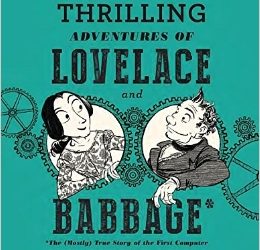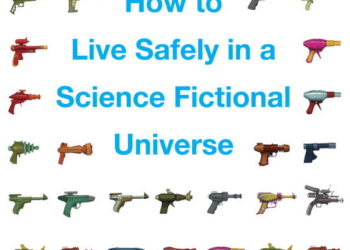Editor’s Note: Continuing an annual tradition, we take a moment to pause at year’s end to look back on the best books we encountered. As always, this is not a “best books of 2018″ list, but a list of the best books the Chefs read during 2018 — the books might be classics, a few years old, or brand new. This is one of the great things about books in all forms — they endure, invite visitation and revisitation, and beckon with ideas. Here’s Part 1 of our list, Part 2 can be found here.
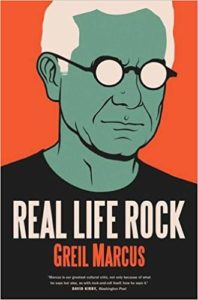 Rick Anderson: I’ve been having a marvelous time with the latest collection of Greil Marcus’s cultural criticism. Titled Real Life Rock, it compiles 28 years of his “Real Life Rock Top Ten” columns, which have appeared in a variety of magazines during that period (it’s currently published by Rolling Stone, but at various times in the past it has made its home at Salon, The Believer, the Village Voice, and Artforum). His focus, predictably enough, is on music (and especially on Bob Dylan), but he also remarks on politics, billboards, books, movies, buskers, art exhibits, TV shows, street flyers, fanzines, and anything else that catches his attention. Each column consists of ten pieces, some only a few words long, and some quite lengthy. The book makes for wonderful browsing and I keep finding myself going back and forth to the index and putting my fingers in multiple pages so I don’t forget to follow up on two or three promising threads of inquiry before I finish reading the entry I’m in the middle of. Marcus was, surprisingly, not terribly well served by his editors at Yale University Press (it’s “Muslimgauze”, not “Muslim Gaze,” for crying out loud), but this book is a pure joy overall.
Rick Anderson: I’ve been having a marvelous time with the latest collection of Greil Marcus’s cultural criticism. Titled Real Life Rock, it compiles 28 years of his “Real Life Rock Top Ten” columns, which have appeared in a variety of magazines during that period (it’s currently published by Rolling Stone, but at various times in the past it has made its home at Salon, The Believer, the Village Voice, and Artforum). His focus, predictably enough, is on music (and especially on Bob Dylan), but he also remarks on politics, billboards, books, movies, buskers, art exhibits, TV shows, street flyers, fanzines, and anything else that catches his attention. Each column consists of ten pieces, some only a few words long, and some quite lengthy. The book makes for wonderful browsing and I keep finding myself going back and forth to the index and putting my fingers in multiple pages so I don’t forget to follow up on two or three promising threads of inquiry before I finish reading the entry I’m in the middle of. Marcus was, surprisingly, not terribly well served by his editors at Yale University Press (it’s “Muslimgauze”, not “Muslim Gaze,” for crying out loud), but this book is a pure joy overall.
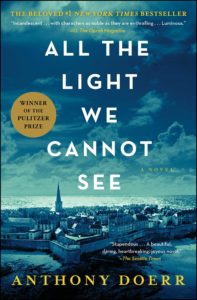 Alice Meadows: I discovered my best book of 2018 completely serendipitously. I was desperately browsing the shelves of a newsstand at Charlotte airport for something — anything! — to read on the second leg of a flight from Boston to San Francisco; the woman standing next to me picked up a copy of All the Light We Cannot See by Anthony Doerr. and said, if you haven’t read this yet, you must. So I did, and I will be forever grateful to that random stranger for a truly wonderful recommendation.
Alice Meadows: I discovered my best book of 2018 completely serendipitously. I was desperately browsing the shelves of a newsstand at Charlotte airport for something — anything! — to read on the second leg of a flight from Boston to San Francisco; the woman standing next to me picked up a copy of All the Light We Cannot See by Anthony Doerr. and said, if you haven’t read this yet, you must. So I did, and I will be forever grateful to that random stranger for a truly wonderful recommendation.
Set mostly before and during World War II, the book tells the story of Marie-Laure, a young, blind French girl who, with her father, flees to St. Malo from Paris just before the Nazi occupation; and Werner, a young German orphan, who becomes a self-taught expert at building and mending radios and, therefore, of great value to the Nazis. Doerr interweaves their two narratives so brilliantly that, although you know from early on that they will intersect, you don’t know exactly when, how, or why. And although it is in many ways a tragic and horrifying account of the brutality of war, it’s also a beautifully written, entirely credible, and ultimately optimistic reminder of people’s capacity for doing good — something that I’ve been much in need of this year, given the horrors that have been unfolding here in the US and around the world. It very deservedly won the 2015 Pulitzer Prize for Fiction, and while I am very embarrassed that I didn’t read it back then, I’m also glad that I read it at a time when this message resonated so profoundly.
I can’t remember a book that I’ve enjoyed reading more and that has affected me so deeply. To echo the words of the woman who handed me my copy; if you haven’t already read it, please do…
Joe Esposito: This year my reading project was James Boswell’s classic biography of Samuel Johnson, Life of Johnson.
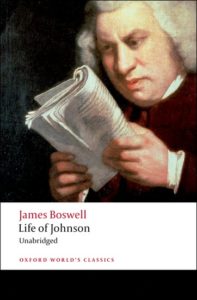 I have dipped into this outstanding (and massive) book many times over the years, but only now have I made it all the way through. Boswell’s Life is often called the greatest biography ever written in English, though I would not wish to choose between it and The Education of Henry Adams. It is a remarkable window into the mind of one of eighteenth-century England’s greatest intellectual figures and it opens up the period to the modern reader. Boswell is both an admiring recorder of Johnson’s extraordinary conversation and at times a bit of an imp, finding occasion to tweak the great man into utterances that are incisive and often funny even as they are irresistibly quotable. Having a few lines of Johnson in your pocket can also serve as a healthy tonic should you find yourself trapped in an elevator with Nicholas Kristof and Michelle Goldberg, suffocating on the sanctimony.
I have dipped into this outstanding (and massive) book many times over the years, but only now have I made it all the way through. Boswell’s Life is often called the greatest biography ever written in English, though I would not wish to choose between it and The Education of Henry Adams. It is a remarkable window into the mind of one of eighteenth-century England’s greatest intellectual figures and it opens up the period to the modern reader. Boswell is both an admiring recorder of Johnson’s extraordinary conversation and at times a bit of an imp, finding occasion to tweak the great man into utterances that are incisive and often funny even as they are irresistibly quotable. Having a few lines of Johnson in your pocket can also serve as a healthy tonic should you find yourself trapped in an elevator with Nicholas Kristof and Michelle Goldberg, suffocating on the sanctimony.
I chose to listen to the audio version of the book, with the hope that I would find a good English baritone to exclaim Johnson’s famous choric “Sir!” I was lucky in the recording by Bernard Mayes, whose voice will forever be Johnson’s to me. This is not an easy book, however, and it is best listened to with a print edition available for perusal. I am myself supplementing the biography with an excellent selection of Johnson’s own work.
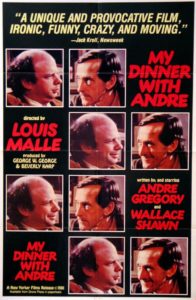 It is a property of Johnson’s work and this biography that at times the moral arguments seem addressed to us directly across the chasm of more than two centuries. At other times, however, the attitudes and opinions anchor Johnson and his contemporaries in that faraway land of the past. And thus we have Johnson and Boswell debating the slave trade: Johnson opposed it, but Boswell leaps to the defense of a historically sanctioned commercial enterprise, remarking that the slaves themselves now lead tolerably good lives. Or there is the denigration of women preachers (analogized to a dog walking on its hind legs) and a Tory’s support of monarchy and opposition to the American rebels.
It is a property of Johnson’s work and this biography that at times the moral arguments seem addressed to us directly across the chasm of more than two centuries. At other times, however, the attitudes and opinions anchor Johnson and his contemporaries in that faraway land of the past. And thus we have Johnson and Boswell debating the slave trade: Johnson opposed it, but Boswell leaps to the defense of a historically sanctioned commercial enterprise, remarking that the slaves themselves now lead tolerably good lives. Or there is the denigration of women preachers (analogized to a dog walking on its hind legs) and a Tory’s support of monarchy and opposition to the American rebels.
Johnson is not for everyone, of course. Modern readers could do worse than to look to the cinema and the great imitation of the Life in My Dinner with Andre, one of my favorite movies. Not based on the Life of Johnson directly but clearly inspired by it, My Dinner with Andre captures the often humorous relationship between the great man (Andre, Johnson) and his acolyte (Wallace Shawn, Boswell). But Boswell and Johnson are the archetype, for which we will see many more manifestations in the years — and centuries — ahead.
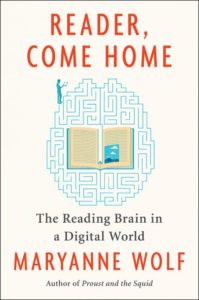 Lettie Conrad: My reading brain is consumed with my part-time doctoral studies, leaving my mental capacity too thin for many extracurricular books — however, I am planning a bit of time off for the upcoming holidays and have a copy of Maryann Wolf’s newest title waiting for me by the fireplace. Reader, Come Home: The Reading Brain in a Digital World is the latest in a series of informative books by Wolf, who expertly blends neuroscience, linguistics, education, and anthropological research. From her unique post as director of the Tufts Center for Reading and Language Research, Wolf demonstrates a modern approach to multidisciplinarity by bringing theories from both social and natural sciences together in conversation.
Lettie Conrad: My reading brain is consumed with my part-time doctoral studies, leaving my mental capacity too thin for many extracurricular books — however, I am planning a bit of time off for the upcoming holidays and have a copy of Maryann Wolf’s newest title waiting for me by the fireplace. Reader, Come Home: The Reading Brain in a Digital World is the latest in a series of informative books by Wolf, who expertly blends neuroscience, linguistics, education, and anthropological research. From her unique post as director of the Tufts Center for Reading and Language Research, Wolf demonstrates a modern approach to multidisciplinarity by bringing theories from both social and natural sciences together in conversation.
As fellow Chef Karin Wulf pointed out in her excellent post last 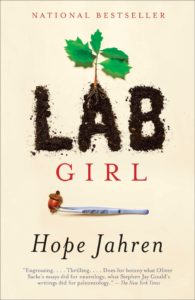 month, the way we interact with texts — and, thereby, with diverse perspectives and knowledge — are in a state of flux. The impacts of our digital information experiences are critically important for the world of scholarly communications to acknowledge and address, as they are poised to change how we intellectually engage with the world around us. A holiday break seems an ideal time to step back and reflect on both the wider trends Wolf observes, as well as my own experiences with reading.
month, the way we interact with texts — and, thereby, with diverse perspectives and knowledge — are in a state of flux. The impacts of our digital information experiences are critically important for the world of scholarly communications to acknowledge and address, as they are poised to change how we intellectually engage with the world around us. A holiday break seems an ideal time to step back and reflect on both the wider trends Wolf observes, as well as my own experiences with reading.
Time permitting, I hope to also pick up a copy of Lab Girl by Hope Jahren. Promising a somewhat lighter fare for holiday reading, Jahren is known for making paleobiological research both accessible and inspiring. Feeding my own affinity for watching things grow, I’m looking forward to taking in Jahren’s scientific journey and her insights about how plant life mirrors our own lives and connections to the planet. Happy reading, everyone!
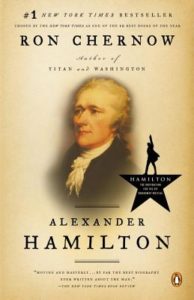 Robert Harington: Like many people, I did not know much about Alexander Hamilton until he came roaring into my life in song. My daughter and her friends know the words and music of every song from the musical; I hear them in the back seat as I drive. Hamilton’s erudition and ability to express himself in the written word has reached out into the 21st century — imagine how he would have basked in his influence! My family is one of many delighted by the musical, but in fact the book, Alexander Hamilton, by Ron Chernow, published in 2004, is a fabulous read, and of course was the inspiration behind Lin Manuel Miranda’s musical – which I imagine was never predicted to be the hit it became.
Robert Harington: Like many people, I did not know much about Alexander Hamilton until he came roaring into my life in song. My daughter and her friends know the words and music of every song from the musical; I hear them in the back seat as I drive. Hamilton’s erudition and ability to express himself in the written word has reached out into the 21st century — imagine how he would have basked in his influence! My family is one of many delighted by the musical, but in fact the book, Alexander Hamilton, by Ron Chernow, published in 2004, is a fabulous read, and of course was the inspiration behind Lin Manuel Miranda’s musical – which I imagine was never predicted to be the hit it became.
The book is huge, and yet reads a bit like a thriller, telling such a good story. Still, what is it about Alexander Hamilton that resonates so strongly with so many of us – not just in the USA?
Hamilton is recognizable as a flawed, yet brilliant character. As you read the book, you watch a boy grow out of a life unimaginably hard, developing ambition, intellectual prowess, and charisma (especially when writing). He was charming, perhaps overly sensitive to criticism, and fundamentally flawed in his emotional entanglements. You recognize in Hamilton someone who should be taken seriously as an idealist, thinker and pragmatist, and yet amidst the ideals there are his overt and implied personal failings. In the end, the significance of his achievements was undone by his temperament.
Just to give you a sense of how important Hamilton was to the development of democracy: he was a visionary architect for the underlying democratic structures of Government. He is of course known for his federalist views, creating the blueprint for centralized banks as well as the notion of a unified military, transcending state control. He wrote and wrote, sometimes in his own name, and sometimes under a pseudonym, and it was as a writer that he was at his most convincing. His battles with republicans — such as Thomas Jefferson — show how our current partisan political battles are not exactly new. What is new is the cultural significance of the re-imagining of Hamilton’s life in musical form, with the founding fathers portrayed by men and women of color, with hip-hop as musical currency. This re-imagining is not just about making the story amusing to kids, but a statement about how current his ideas are, especially the relevance of the nature of ideals, as ideals seem to be so easily lost. We see our current partisan political battles as being less about ideals, and more about money, and power – although these, too were at play in Hamilton’s time.
For me then, the book, and the musical was a revelation for all the senses, and by far was the best read and musical experience of 2018.
Discussion
3 Thoughts on "Chefs’ Selections: The Best Books Read During 2018 Part 1"
I was delighted to see Joe Esposito’s advocacy of James Boswell’s classic biography of Samuel Johnson, “Life of Johnson.” Our bookstore, University Press Books/Berkeley has a seven-year long series “Reading the Classics with Ken Knabb,” which is currently reading aloud both Boswell and Johnson. About twenty people gather biweekly around our Great Table in the back of UPB/Berkeley — reading aloud, drinking wine, and having sandwiches — for two hours Sunday nights. Imagine that, in this day and age, twenty readers of real books meeting together in a real bookstore!
I listened to the audiobook of All the Light We Cannot See by Anthony Doerr, and it — the book, as well as the performance by Zach Appelman — was 16 hours of gorgeous.
Alice, I completely agree with you about All the Light We Cannot See recommended! I loved the two voices and perspectives from both sides of the war. I could hardly put it down.
Thank you for the other recommendations in the post! I’ll look forward to picking some of them up.

